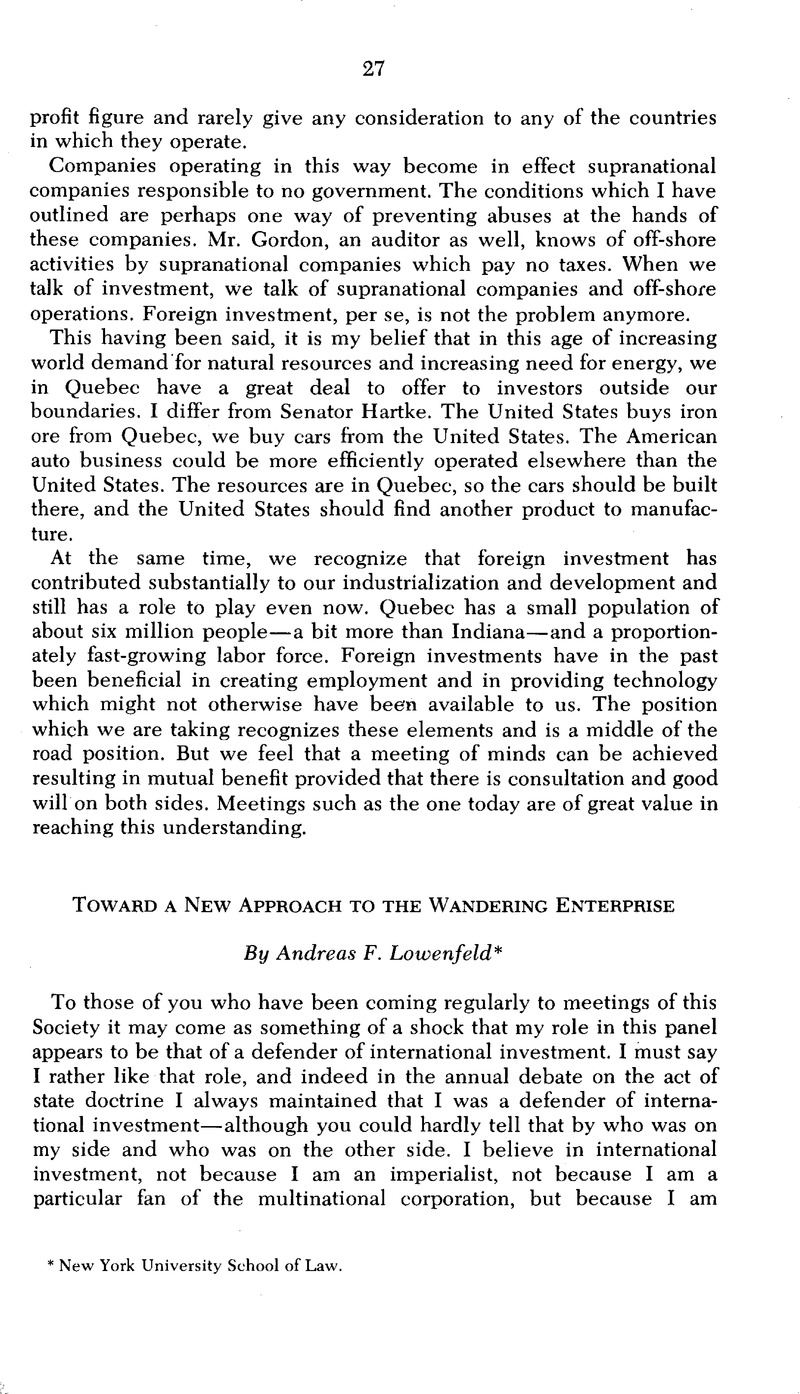No CrossRef data available.
Published online by Cambridge University Press: 28 February 2017

1 The comparable term in United States law is “alien lawfully admitted for permanent residence.“
2 It is worth remarking that controls based on movement of goods — for instance restraints on reexport from Canada of goods exported under license from the United States—provoke far less controversy or resentment.
3 Foreign Investment Review Act adopted Dec. 12, 1973, 21-22 Elizabeth II, c. 46 (hereafter FIRA).
4 This may be an oversimplification: A Canadian business is described in §3(1) of the FIRA to include a business carried on in Canada by an individual who is either a Canadian citizen or a person ordinarily resident in Canada. But a “non-eligible person” includes a landed immigrant who has been ordinarily resident in Canada for more than a year after he became eligible for citizenship and has not applied for Canadian citizenship, and corporations controlled by persons in the latter category.
5 FIRA §8(2) (b). Mr. Gordon, it appears, would, in his milder or fall-back position, require a license for anysort of expansion, even into related fields or in the same field of activity already engaged in.
6 FIRA §10, §12.
7 SeeFIRA §2(2). It appears that judicial review, which is available in respect of other findings called for under the Act, such as the meaning of “related industry” or the facts of control by a “non-eligible person,” is not available in respect of the policy determination under §12 according to the criteria set forth in §2(2). This, at any rate, has been the position of the government. SeeProceedings of the Standing Senate Comm. on Banking, Trade & Commerce, Issue 23, Dec. 11, 1973 remarks of F. Gibson, (Legisl. Section, Dept. of Justice) at 16-17; Dept. of Industry, Trade, and Commerce, News Release, 24 Jan. 1973, Background Information at 17. Compare, e.g.,D. R. Fraser & Co. v. Minister of Nat. Revenue [1949] A.C. 24 (P.C.), [1948] 2 W.W.R. 1119, [1948] 4 D.L.R. 776.
8 See31 C.F.R. §500.329 and .300 (Foreign Assets Control Regulations); 31 C.F.R. §515.329 and .330 (Cuban Assets Control Regulations), and in the latter also §515.541 worked out to give Canadians some, but not cpmplete relief from the extraterritorial application of the U.S. embargo on trade with Cuba.
9 I am grateful to William Diebold, Jr., for helping me formulate this point.
10 Just as a tentative suggestion, one might propose something like the following: The state of establishment may not treat the foreign-linked enterprise differently in terms of taxes, labor law, food and drug and similar laws, securities laws, and antitrust or the like; it may, however, impose supervisory controls on procurement practices, on transfer prices where the enterprise purchases from the parent, and on restraints against exports. The state of capital source may see to it that establishment abroad is not undertaken to avoid domestic legislation (or better certain specified categories of domestic legislation such as securities and antitrust laws). Requirements for repatriation of earnings, as the United States tried for a while under the Foreign Direct Investment Regulations, are questionable, though probably should not be ruled out a priori, at least unless a corresponding restraint is placed on the host country against restricting remittance of dividends. As to political trade controls, one might think of (i) a formal consultation procedure between governments; (ii) a set of guidelines related to the value added in the host country, the uniqueness of the product, and the uses to which the product could be put.